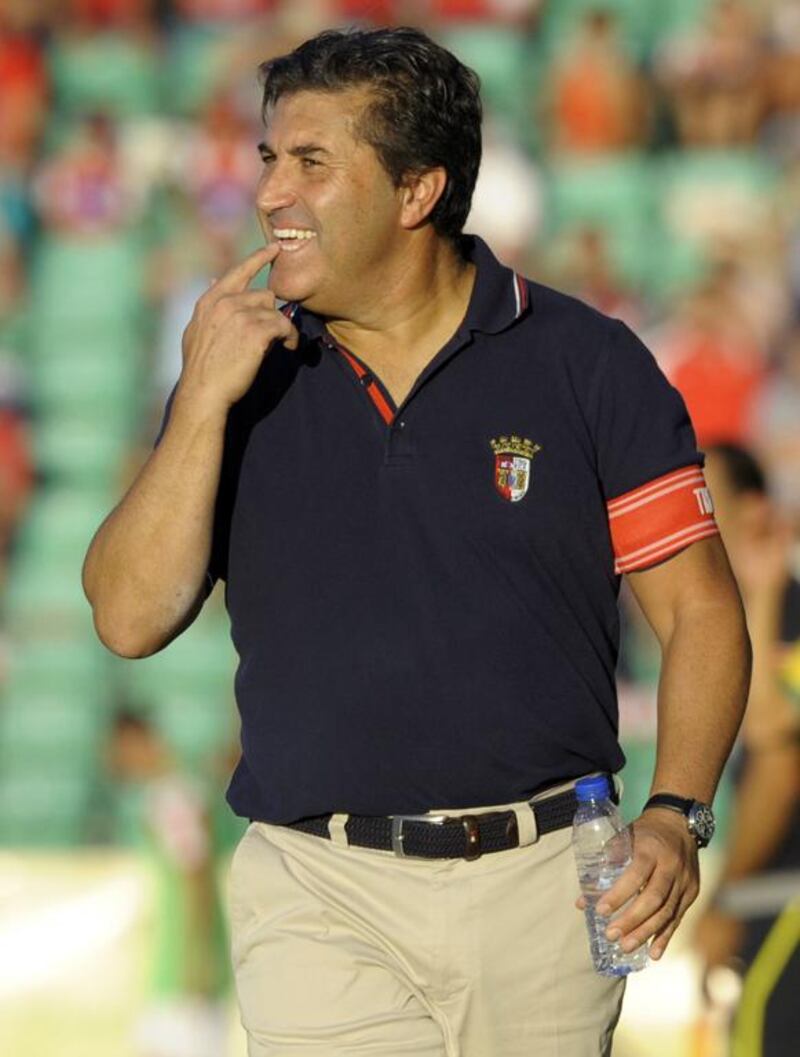Almost every elite Portuguese coach between the ages of 35 and 55 has, over the past decade, carried with him a mixed blessing.
Thanks to one celebrated compatriot, a man who enjoys repeated successes and has cultivated a very high profile, a small country’s reputation for professionalism and elevated standards in management has grown.
So has the demand for Portuguese expertise in foreign dugouts. Only the Netherlands exports such a concentration of able coaches as Portugal.
The downside is that the achievements of that single superstar of his trade also casts a long shadow against which contemporaries are measured.
None can compete with the list of honours compiled by Jose Mourinho. Indeed, to be a Portuguese coaching at the highest level must sometimes feel a bit like being a footballer in the Portugal national team who does not wear the No 7 jersey, as among Portuguese players, there is only one Cristiano Ronaldo.
Around him, others merely orbit.
In the management hierarchy, there is Mourinho and then there is the “school of Mourinho”, a group of talented coaches but all operating in the broad wake of the Chelsea and former Inter Milan and Real Madrid manager.
The Mourinho school includes men such as Andre Villas-Boas of Tottenham Hotspur; Domingos Paciencia, formerly of Braga, Sporting and Deportivo La Coruna; Vitor Pereira and Jose Couceiro, both formerly of Porto.
But no one who has established himself as a "go-to" modern manager shares so many common points with Mourinho as does Jose Peseiro, now installed at Al Wahda, who are struggling in mid-table.
The Abu Dhabi club are bound to hope Peseiro has some of the instant impact, the firm authority and the rigour of the self-styled “Special One”.
Peseiro, 53, and Mourinho, 50, were once fellow students at Lisbon’s Superior Institute of Physical Education.
Each is known to their friends as “Ze”, short for “Jose”, and got on well. They found that, in terms of background, they already shared certain traits.
Neither had been players of great renown, but neither felt constrained by that on their chosen paths in the game. Both made an impression on the gurus of Portuguese football of the early 1990s, such as Carlos Queiroz.
Queiroz took note of Peseiro’s resourcefulness and progressive work with various lower-division clubs through the 1990s, and how he guided Nacional, the club from the island of Madeira, up to the top tier of Portuguese football and gave them the platform to thrive there.
In 2003, Peseiro was invited to work at what was then the most glamorous club in the world, Real Madrid, as assistant to the newly appointed Queiroz. It is fair to report neither of their arrivals at the Bernabeu was the most newsworthy of that summer. David Beckham signed for Madrid at the same time, the height of Madrid’s “galactico” epoch, a captivating but also challenging time for a young coach. Peseiro would later reflect to reporters on the stimulation of working with “a finisher like Raul, a talent like [Brazil’s] Ronaldo, even if he was not 100 per cent fit, with Zidane, who made music when the ball came to his feet, and Luis Figo, who, all things considered, was the best player to coach”.
The adventure lasted one year, just about par for most coaches at Madrid.
Twelve months into Peseiro’s next job, he really did look like a New Mou.
Like Mourinho, he had come to the attention of a big Portuguese club thanks to good work at a modest club – Mourinho had lifted Uniao de Leiria, as Peseiro had Nacional – as well as a stint on the staff of a Spanish giant, Mourinho having assisted at Barcelona in the 1990s.
Porto had made Mourinho their coach and promptly reached a European final at the end of his first full season in charge. When Sporting, in Lisbon, took on Peseiro, the same thing happened: Sporting made the 2004/05 Uefa Cup final.
It was there that Peseiro came to know intimately the fine margin between triumph and second place.
He is sometimes known as “The Nearly Coach” in his home country. Sporting had taken the lead in that Uefa Cup final, staged at Sporting’s Alvalade Stadium, but lost to CSKA Moscow.
The same week they had lost their grip of a domestic-title race in which they had led the table during the penultimate round of fixtures. Patience runs out quickly at places like Sporting, where Peseiro’s commitment to attacking, easy-on-the-eye football is remembered with appreciation, but where there were also fall-outs with senior professionals.
He has taken on a range of jobs since then, including Panathinaikos in Greece, and Braga, whom he led to a domestic cup championship in Portugal.
Other gigs have been an instruction in how to deal with adversity. Of his time with Rapid Bucharest, he recalls having to sort out salary backlogs on behalf of players.
Peseiro has experience in the Middle East thanks to spells in Saudi Arabia, both with Al Hilal and later with the national squad.
Assigned to oversee the 2010 World Cup qualifying campaign and the 2011 Asian Cup, Peseiro fell short of the targets. Knocked out of contention for the last World Cup at the penultimate stage, Saudi Arabia then began the Asian Cup poorly and Peseiro’s contract was terminated.
Yet he remains well thought of there, particularly by those who know him best.
According to Queiroz, now the coach of Iran, “everyone knows Jose has done excellent work at his clubs. He comes with a high level of professional ability, and will give every job he does great determination and enthusiasm, every day”.
sports@thenational.ae
Follow us on twitter at @SprtNationalUAE






